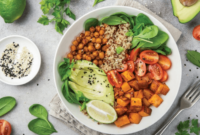As more people become aware of the importance of gut health, the demand for foods that support a balanced microbiome is on the rise. A healthy gut is linked to improved digestion, better immunity, and even mental well-being. In 2025, gut-friendly foods are evolving with new innovations, ancient remedies, and scientific advancements. Whether you’re looking to boost your digestive system or enhance overall health, here are the best gut-healthy foods you should include in your diet.
1. Fermented Foods for Probiotics
Fermented foods remain a powerhouse for gut health. They contain probiotics—live beneficial bacteria that support digestive balance. In 2025, more people are consuming fermented foods due to their ability to enhance gut flora and improve digestion.
- Kefir: A fermented dairy or plant-based drink loaded with probiotics.
- Kimchi: A spicy Korean side dish made from fermented vegetables.
- Sauerkraut: Fermented cabbage rich in gut-friendly bacteria and fiber.
- Miso: A Japanese seasoning made from fermented soybeans, which supports digestion.
- Tempeh: A fermented soy product that provides both probiotics and protein.
2. Prebiotic-Rich Foods
Prebiotics are dietary fibers that feed beneficial gut bacteria. Without prebiotics, probiotics wouldn’t thrive, making these foods essential for gut health.
- Chicory root: A top source of inulin, a type of prebiotic fiber.
- Garlic and onions: Contain natural prebiotics that help beneficial bacteria grow.
- Bananas: Particularly green bananas, which are high in resistant starch.
- Asparagus: Supports gut bacteria and is packed with fiber.
- Oats: A great source of beta-glucan, which promotes gut health.
3. Collagen-Rich Foods for Gut Lining Support
Collagen plays a crucial role in maintaining a healthy gut lining, preventing leaky gut syndrome and improving digestion.
- Bone broth: A powerful source of collagen and amino acids that soothe the gut lining.
- Salmon: High in omega-3 fatty acids, which support gut and skin health.
- Eggs: Contain nutrients that aid in collagen production.
- Chicken skin: A natural source of collagen that many overlook.
4. High-Fiber Foods for a Balanced Gut
Dietary fiber is essential for digestion and keeping bowel movements regular. Insoluble and soluble fibers work together to support gut health.
- Legumes: Lentils, chickpeas, and black beans are high in fiber.
- Berries: Blueberries, raspberries, and strawberries provide fiber and antioxidants.
- Chia seeds and flaxseeds: These super seeds contain both fiber and omega-3s.
- Leafy greens: Spinach, kale, and Swiss chard promote good bacteria growth.
5. Polyphenol-Rich Foods for a Healthy Microbiome
Polyphenols are plant compounds that act as antioxidants and fuel for good gut bacteria.
- Dark chocolate: Contains flavonoids that help beneficial bacteria grow.
- Green tea: Rich in catechins, which improve gut health.
- Red wine (in moderation): Contains resveratrol, a polyphenol with microbiome benefits.
- Turmeric: Curcumin, the active compound, reduces gut inflammation.
- Berries: Another polyphenol-rich food that feeds good gut bacteria.
6. Postbiotic Foods: The Next Big Trend
Postbiotics are byproducts of probiotic bacteria that offer health benefits. In 2025, expect more foods to include postbiotics for improved gut health.
- Fermented dairy products: Contain metabolites that benefit digestion.
- Sourdough bread: Rich in postbiotics due to its fermentation process.
- Kombucha: A fermented tea with postbiotic compounds.
- Pickled vegetables: Naturally contain postbiotic benefits.
7. Low-Sugar and Anti-Inflammatory Foods
Excess sugar feeds harmful bacteria and leads to gut imbalance. Focusing on anti-inflammatory foods can prevent digestive issues.
- Avocados: Packed with fiber and healthy fats.
- Ginger: Known for its anti-inflammatory and digestive properties.
- Turmeric: Helps to reduce gut inflammation.
- Fatty fish: Salmon, mackerel, and sardines provide omega-3s that support gut health.
- Olive oil: Contains polyphenols that promote a healthy gut environment.
The Future of Gut Health in 2025
With technological advancements, gut-friendly foods are becoming more innovative. Some trends to watch include:
- Personalized nutrition: Companies using AI to recommend gut-friendly diets.
- Synbiotic supplements: Combining probiotics and prebiotics for optimal gut health.
- Food labeling for gut health: More brands highlighting prebiotic and probiotic content.
- Plant-based gut health options: Expanding choices for vegan-friendly probiotic foods.
Conclusion
In 2025, gut health is more important than ever. By incorporating fermented foods, fiber-rich ingredients, collagen sources, and polyphenol-packed choices, you can support digestion, improve immunity, and boost overall well-being. With new innovations on the horizon, the future of gut health looks promising. Make these gut-friendly foods a staple in your diet to optimize health and longevity.




